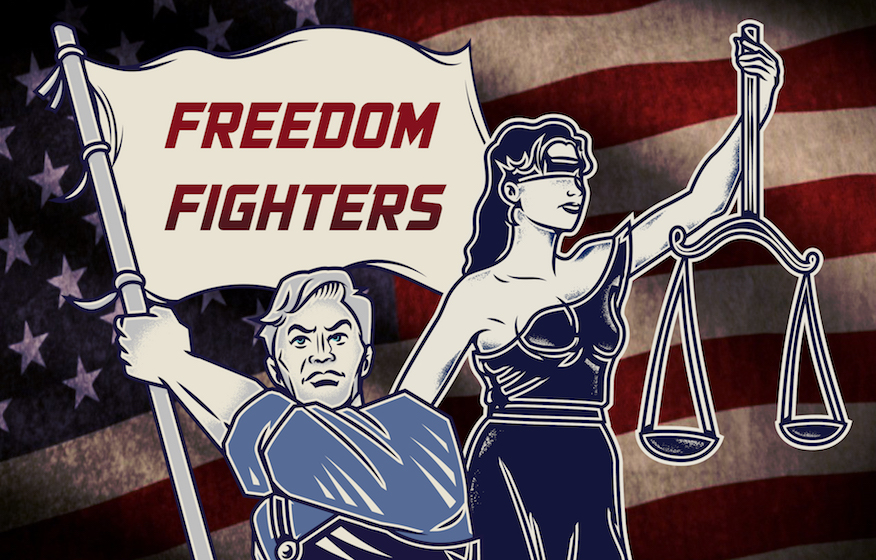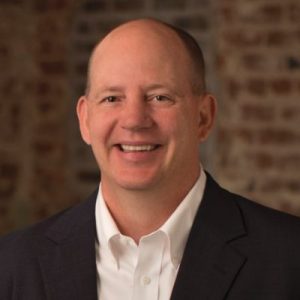Legal Freedom Fighter Series: Mick Wagoner, Founder of Veterans Legal Support Network

We’ve seen it repeatedly throughout our history: When people’s rights are threatened, it’s the lawyers who step up to the plate. Some are true Freedom Fighters, and they deserve special recognition. That’s why each month, we will feature lawyers who are really making a difference.
 Today, we are proud to feature Mick Wagoner. Mick is the founder and Executive Director of Veterans Legal Support Network, a nonprofit in Omaha, Nebraska dedicated to answering the unmet legal needs of veterans in Nebraska and the surrounding areas. Their focus areas include discharge upgrades, disability appeals, incarcerated veterans, and veterans in the court system. They are also a resource for family members of veterans and active duty service members who are seeking assistance answering questions related to the Departments of Defense and Veterans Affairs.
Today, we are proud to feature Mick Wagoner. Mick is the founder and Executive Director of Veterans Legal Support Network, a nonprofit in Omaha, Nebraska dedicated to answering the unmet legal needs of veterans in Nebraska and the surrounding areas. Their focus areas include discharge upgrades, disability appeals, incarcerated veterans, and veterans in the court system. They are also a resource for family members of veterans and active duty service members who are seeking assistance answering questions related to the Departments of Defense and Veterans Affairs.
A 3rd generation lawyer, Mick also served over 23 years in the United States Marine Corps. His deployments included Saudi Arabia in 1991, Somalia in 1993 , as well as Afghanistan in 2001 and Iraq in 2003. Today, he also teaches Law of Armed Conflict (LOAC) at Creighton University School of Law.
Here’s the interview:
What inspired you to become a lawyer in the first place, and why did you decide to focus on veterans?
My father inspired me to become a lawyer, as did his uncle, my aunt, and numerous cousins who are all attorneys. I saw firsthand from an early age what lawyers can do for people. I never really wanted to do anything else. I was commissioned in the Marine Corps out of college and became a Motor Transport Officer. However, the goal was always to become a lawyer, which happened a few years later.
The career in the Corps is part of who I am. It isn’t everything, but being an Officer comes with a strong responsibility to take care of your Marines. I had the fortune of having a Jesuit education as well that taught me about being a “Man for Others.” Those two driving forces have inculcated in me a belief that I have been given many gifts, and it is my responsibility to use them to give back more than I’ve received. That is what I’m trying to do with Veterans Legal Support Network.
Why did you start the Veterans Legal Support Network?
We started Veterans Legal Support Network (VLSN) because we saw a need to provide certain legal services that were tied to military service that the local bar didn’t have much experience in and quite frankly didn’t pay much attention to either. That is a classic nonprofit space. We work with veterans who have less-than-honorable discharges. We appeal their discharges in the hopes that with a “better” discharge they will be eligible for benefits they likely should have had to begin with. We also work with veterans in our jails and state prisons. Our final emphasis area is working with homeless vets, again usually with discharge upgrades. (There is a direct correlation between discharge status and homelessness.) These men and women are still veterans and need our help more than most. It’s our honor to serve them and help them get their lives back on track.
War is a brutal teacher. It is likely one of the most significant events a person will face. Even with that, the vast majority of veterans I know don’t want handouts. They want a fair shake and if they were hurt serving, they would like a fair compensation. They’d much rather have their arm or their hearing back, and they decidedly would avoid any of the nightmares or flashbacks that come with warfare, but that choice is gone and they must go on living and supporting their families. VLSN aims to help them do that.
What was your most memorable case?
Early in my Marine Corps career, I took on a sexual assault case to trial with a Gunnery Sergeant who insisted he was innocent. We knew we had a chance, but we had witnesses against us, including an apparently compelling victim. When she was on the stand, the moment came to ask some pretty specific questions about my client’s physique, and I didn’t know how she was going to answer. I asked if she could identify any scars on the defendant’s chest. She said “Yes,” and I asked her to explain them. She said he had a 3-inch scar on his shoulder and that’s it. I quickly ended the cross examination. I then called my client up and asked him to take off his uniform shirt and show the members of the jury his chest. It looked like a jigsaw puzzle from all his surgeries he had over a dozen years. The jury deliberated about 10 minutes and came back “not guilty” on all charges. I learned many things in that trial: First, people will lie about something very serious. Another was that sometimes the client is right even when the evidence looks overwhelming at first. The final thing I learned is that nothing is as gut-wrenching as standing next to a person when a jury is reading their fate after a long trial, and you were the one responsible to fight for them.
From the perspective of how we treat our veterans, where do we stand today compared to previous years and decades?
You have to look at which “veterans” are we talking about? If you say the Vietnam generation that returned to an ungrateful and quite frankly disgraceful nation, we have it much better today. If you compare to World War II, the nation as a whole was so much more engaged. The Congress passed the GI Bill and created the greatest economic and social boom this country has ever seen. However, we also lost 250,000 Americans in that war. In Korea we lost over 30,000 in only 3 years. In Vietnam we lost over 50,000. From when I went to war in Desert Storm in 1991 to today, we have lost over 10,000. But we also sent the same 600,000 back for repeated stressful engagements, many times over a year long. We are only beginning to see the damage that does.
The way I always looked at it, someone always has it worse than you do and someone always has it better. If you are in THE worst situation, it just plain stinks, (and that’s not really the words I would really use either.)
When I look at America today, I try to remember several things. We didn’t have a PTSD diagnosis in the Diagnostic and Statistical Manual of Mental Disorders until 1983. But we sure as heck had PTSD before that. The Veterans Administration has run hot and cold with veterans, as has our veterans service organizations and as mentioned above, the American population and the politicians who represent them have had better and worse moments too. Our history of how we treat our veterans goes back to our nation’s foundation. It is not a smooth or even path, but VLSN and other veteran organizations are trying to make sure it continues to improve.
When it comes to helping veterans, which challeneges do you face today that you never encourtered before?
Post-traumatic Stress Disorder (PTSD). Veterans with PTSD and Traumatic Brain Injury and other mental INJURIES look so normal to you and me. They have learned to cope and cover for their injuries.
Here’s the example I ran into early in my work with VLSN. I gave a veteran a relatively manageable task, such as getting a form turned into the VA hospital. When I checked back, it hadn’t been done. I ask why and got excuses. It made me frustrated.
Before the injury, this veteran could do multiple things well, including in high stress situations, and the worst part is they know it too. Now they cannot get a simple one page form turned into the VA. That drives their frustration as well as that of their support network who only wants to help their veteran. The veteran will likely self-medicate with drugs and alcohol to dull the frustration. Then they will get into a confrontation with a family member or a neighbor or a random driver who cuts them off on the highway. Then they get arrested and thrown into the criminal justice system. This is why we need veterans courts and organizations like mine to advocate for veterans.
For the veterans themselves, the biggest challenge is asking for help. They were trained and trained well to improvise and make things happen to complete their missions. No excuses and if their buddy needed help, it was up to them to take on extra work. Now that they are out of the military, they need to accept that they need help and seek it out. They also need to recognize that they need others. The worst thing our veterans can do is bunker themselves in their basement after getting out of the military. There is a life outside of the military, but they have to seek it out. That is one of the challenges we face today.
You’ve had so many successes. Which one stands out the most for you?
During my Marine career I was a small part of the invasion of Afghanistan with the 15th Marine Expeditionary Unit in 2001. It was historical, even by Marine Corps standards, and as a student of history, that means a lot. Since coming back to Nebraska, the success that stands out most for me would be being part of a large group of veterans and veteran advocates to get our Veterans Treatment Courts opened here in Nebraska.
If you could give one piece of advice to other lawyers, what would you say?
If I was going to advise a new attorney, I’d say, “You have been given much, so use some of it to help others.” They need to pay off those God awful loans, but at the end of the day, they can earn a good living and are in a pretty good place. Use that to help someone who is not.
If an attorney wants to get involved in social justice, how can they get started?
The short answer is: Go find a group you want to help and put your name in the hat. They’ll be glad to have you do anything you can. Also, remember you don’t have to be an expert to help. So many lawyers, myself included, have thought, “I’m not a Landlord Tenant attorney, I can’t take that case.” Or “I don’t do family law, I can’t afford to take 20 hours to adequately prepare for a custody case.” You are holding yourself to a standard that is probably too high. Start small and talk to a nonprofit that interests you. They should have liability insurance and the ability to help walk you through their process. You don’t need to take on eight cases. Just one helps.
Share post:







